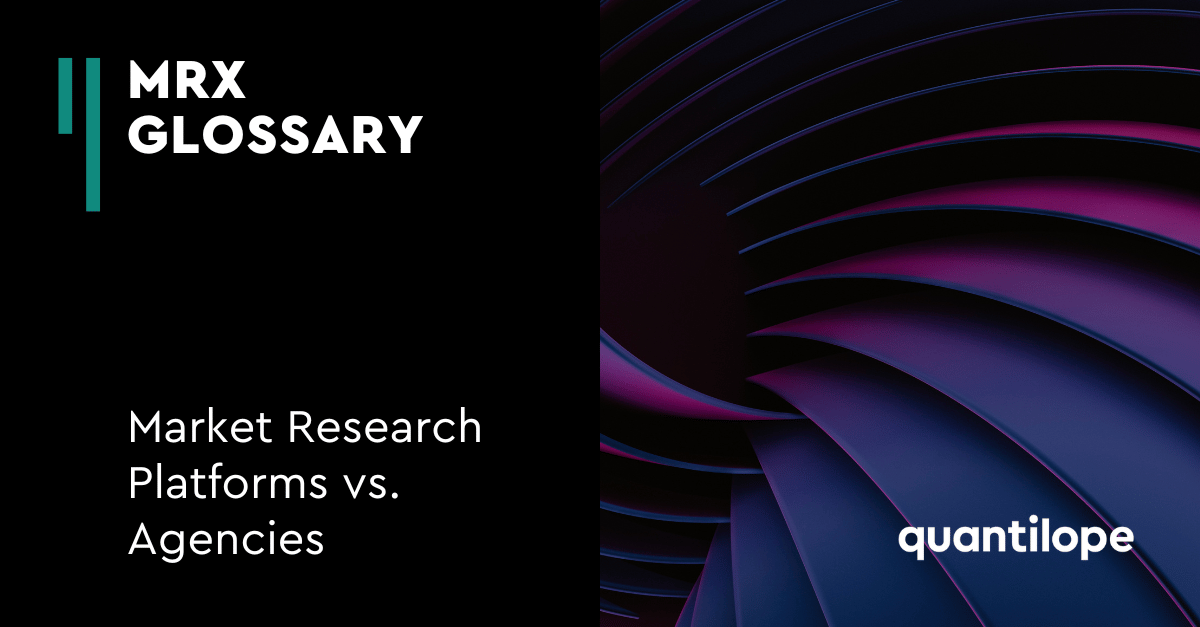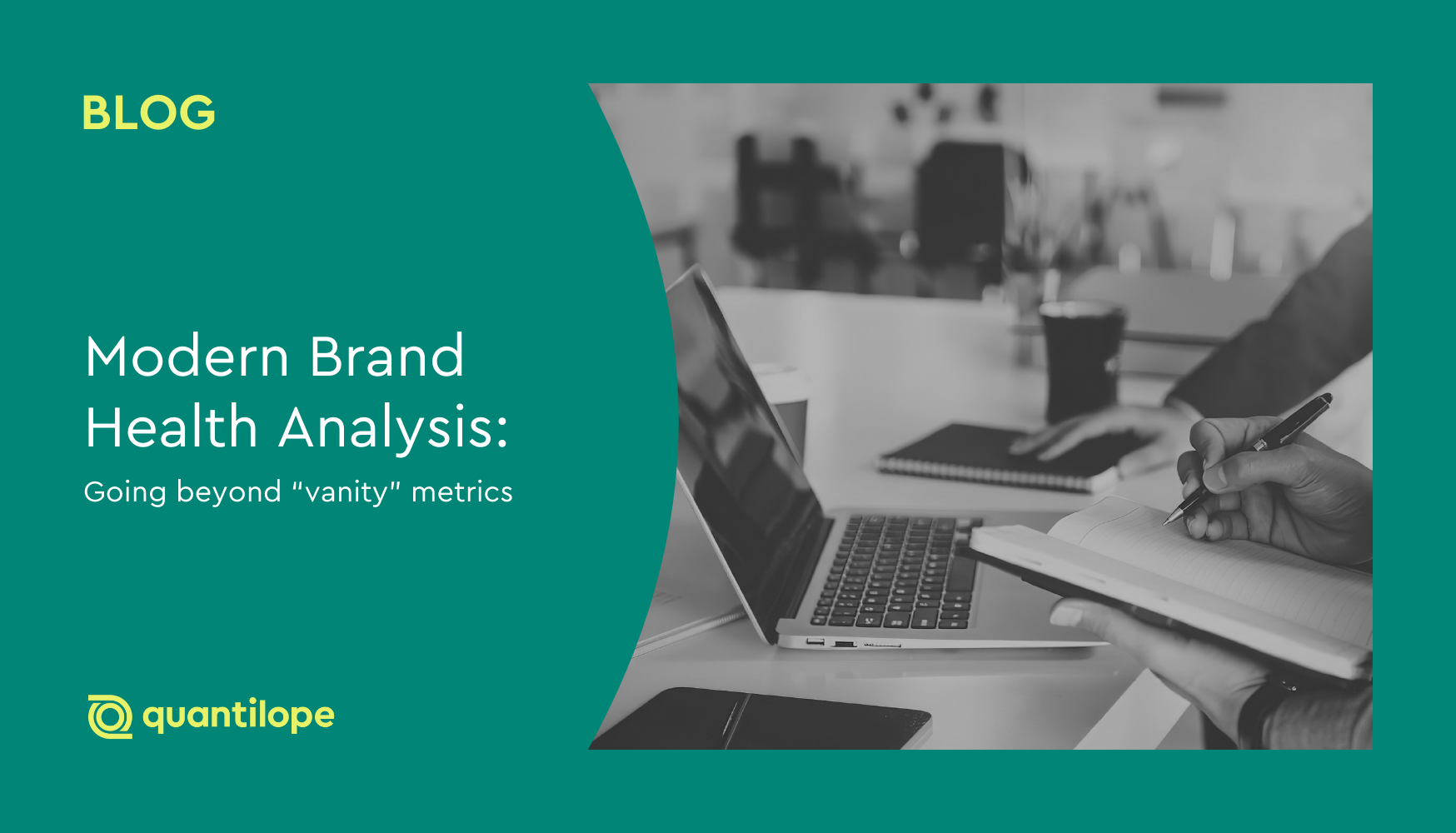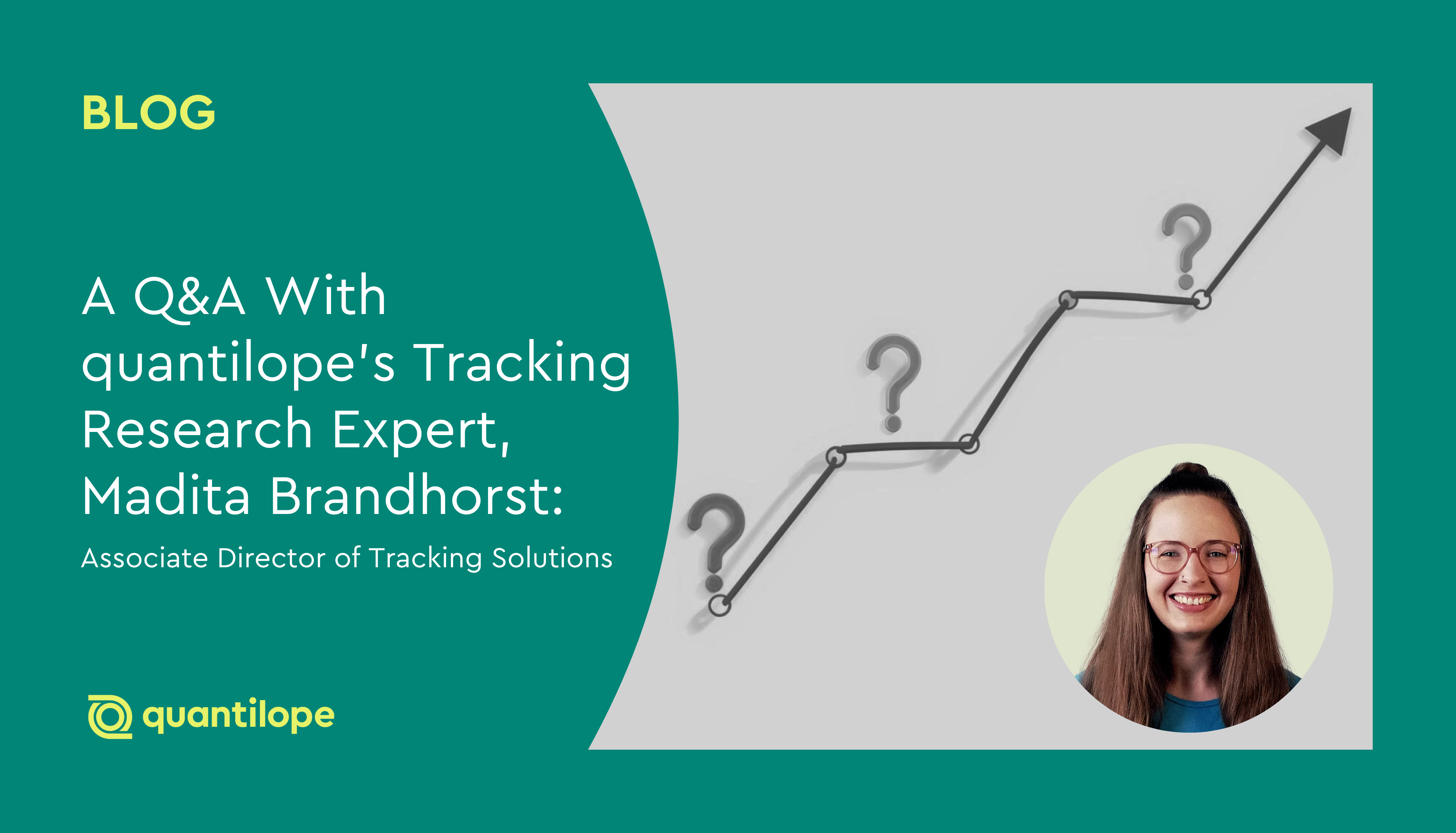This blog post is dedicated to a comparison between market research platform solutions and traditional market research agencies.
Throughout this post, we’ll explore the differences between research solutions and how to make the right choice for your unique research objectives.
Table of Contents:
-
Should you choose a platform or an agency for market research?
-
How to choose the right market research platform for your needs
Market research studies: platforms vs. agencies
There are several key differences between market research platforms and traditional market research agencies - both with their unique pros and cons. Below are a few key areas where their differences stand out:
Timing
One of the major differences between platform research projects and projects conducted through a market research agency is timing. Most platforms use automation to speed up manual processes like survey programming, data cleaning, charting analysis, and reporting. This means researchers don’t need to pass a document back and forth with changes, manually sift through open-ended responses, build charts from scratch, or put together a report. In other words, platform users are saving time at each stage of the research process, speeding up the overall timing of a research project. In today’s quickly-changing market, brands need decisions fast, leading many to opt for platforms for real-time insights.
Users interested in using market research agencies should check on their automation capacities and confirm timing expectations upfront. Oftentimes, traditional agencies will have dedicated teams for each of these processes listed above - each with its own dedicated timing expectations.
Budget
Similar to the note above regarding traditional agency’s dedicated team timelines, these teams also come with added costs given they are leveraging experts in each area. Each team (data programming, data processing, data collection, charting, etc.) charges a fee which will be bundled up into a total price for an agency client.
As for research platforms, most will charge a plan fee for access to the software (full-service or DIY), and the client will pay for any panel sample costs each time they run a study. This helps keep budgeting simple and concise; clients don’t have to wonder where their money is going when they pay for access to a research platform. Because there are fewer individual teams and resources involved with market research platforms, the overall budget tends to be much lower than agency fees as well.
Customization
If standardized questionnaire templates, data crosstabs, and slide presentations aren’t your style, market research platforms might be for you. Research platforms allow users to customize their survey set up in seconds, add or delete questions, incorporate their own brand colors and logos with a few clicks of the mouse, visualize data in a variety of charting options, and display their findings through interactive dashboards. Any changes a client wants to make can be made in a matter of seconds, rather than having to communicate with an agency team every time they wish to make a desired edit.
Research platforms also make it simple to create a variety of charts/dashboards that cater to specific teams. For example, if the marketing team wants to see brand awareness data and the sales team is only interested in the sales numbers for that quarter, it’s quick to generate different, customized versions of a final report.
Expertise
To run an advanced study, such as one with an advanced methodology or complex logic, brands often leverage experts at research agencies to lead the efforts. These are experts with degrees in statistics and behavioral science who know how the methods work from back to front.
With research platforms, most of this complex programming is automated, allowing users of any research expertise to run advanced studies in-house. With platform software, you don’t need to have a statistics degree or know how segmentation works (for example) to be able to capture advanced findings. Access to these tools creates opportunities to make better business decisions grounded on scientific data findings - even if you’re not a scientist.
Collaboration
Traditional market research agencies can be exactly that - traditional. This often means color-coded documents passed back and forth between teams leading to version control issues and miscommunication.
Platforms remove those mixed signals - allowing research teams to collaborate directly through tagged comments, real-time questionnaire changes on a single version, and shared report links. Multiple team members can be working in the platform at once, answering each other’s comments/questions and building charts that all feed into one central report. This speeds up the timing to final insights, and thus, faster business decisions.
Back to Table of Contents
Should you choose a platform or an agency for market research?
It all depends!
Choose a research platform if...
-
You need quantitative research insights fast and want to review data in real-time
-
You want customization for your survey programming, charting, and reporting
-
You want to leverage advanced methodologies but don’t have the background/expertise
-
You want to own your own research process using a DIY/self-service approach
-
You want to work with a team of researchers yet remain close to the research process
-
You have a limited budget but can’t sacrifice consumer intelligence metrics
Choose a research agency if...
-
You aren’t under a time constraint
-
You have a large budget to dedicate to research
-
You don’t need access to the data until field is complete
-
You prefer to stick to traditional ways of research - even if it means extended timelines and standardized outputs
-
You prefer to hand off the entire research process to another team (though many platforms do come with fully-managed services as well)
-
You’re looking to run extensive focus groups or in-depth interviews
How to choose the right market research platform for your needs
While most researchers are aware of the traditional agencies that have been around for many years, there are now a ton of market research platform providers which can make it an overwhelming choice for insights teams and researchers.
Here are a few features to keep in mind when narrowing down your choice of a market research platform, should you choose to go that route:
Ease of survey setup
Setting up a survey requires a lot of thought and attention to detail. You’ll want to look for a research platform that makes this setup process simple - whether that’s a pre-programmed library of questions and advanced research methods, survey templates to use as a foundation, drag + drop functionality of modules, easy customization of questions/branding colors/images, and a simple way to connect respondent panels.
Advanced methodologies/solutions
Aside from basic descriptive metrics like usage and attitude or behavioral questions, vet survey platforms for advanced method and solution capabilities. Will you be able to include a MaxDiff or TURF analysis with ease? Does the platform support tracking research? Will a segmentation study take weeks and require a lot of pre-existing knowledge? These are all important elements to consider to ensure you’re investing in a research platform well worth your budget and one that fits your specific needs.
Reporting/Visualization
To bring your study altogether, you’ll want a platform with strong data visualization options. Look for platforms that automate the reporting/charting process, include automated statistical testing, and generate shareable dashboard links.
Real-time data access
When selecting a research platform, make sure you’ll have access to the data in real-time as respondents complete your survey. This is one of the major benefits of a platform over a market research agency - the latter of which often doesn't allow you to get a first look at the data until all respondents have completed your questionnaire. Real-time data access lets you get a head start on your analysis, resulting in faster decision-making.
Research support
Insights teams will vary in terms of the support they’re looking for in a research vendor. Some teams might be looking to completely hand off their research objectives and let a research team handle it, while others are hoping to stay more hands-on with the research process. Look for a platform that suits your specific needs - one that has a dedicated team of researchers for fully managed services, one that is DIY and lets you take complete control in-house, or one that combines a little of each approach.
Cross-team collaboration
When setting up and analyzing a research study, efficiency is key. Look for a platform that allows your team to cross-collaborate on the survey and analytics process at the same time, without version control issues or user limitations. Features like comment tagging, multi-user access for simultaneous editing, and collaborative report links for storing charts can save a huge amount of time and avoid miscommunications or back-and-forth delays.
Back to Table of Contents
A few market research platforms and agencies to explore:
Related: 12 Innovative Market Research Companies & Agencies to Consider in 2026
Platforms:
- quantilope:
quantilope’s consumer intelligence platform offers all the above features of an automated market research platform. From the initial survey creation using templates or drag + drop modules, to a panel agnostic setup, real-time access to fielding progress, and automated charting/reporting, quantilope makes the research process quick, affordable, and accessible to researchers of any background or skill set. Choose between a fully managed research project led by your team of dedicated research consultants, or, take a more hands-on approach with a DIY platform option. - Qualtrics:
Qualtrics is a market research software and experience management company. They provide market research solutions such as employee engagement software, voice of customer software, and customer feedback surveys. Within these studies, they offer a number of advanced methods such as NPS, pricing methods, concept testing, and market segmentation. Like quantilope, Qualtrics offers fully managed services though their price tag is considered to run higher than other platform alternatives. - SurveyMonkey (by Momentive):
Like Qualtrics, SurveyMonkey (now operating under Momentive), is an experience management company specializing in market insights, employee experience, and online survey development. Similar to quantilope, SurveyMonkey users can leverage a number of survey templates to quickly and easily set up a basic insights study. The platform is known for its quick-and-simple insights capture, rather than its survey design, advanced method capabilities, or customer support.
Agencies:
- Nielsen:
Chances are you’ve probably heard of Nielsen - the audience measurement platform for TV, movies, sports, music, podcasts, and more. Nielsen is the market research agency responsible for historically well-known TV ratings, and ratings of today’s streaming landscape. With its own panel of global data across a variety of audience viewing platforms, Nielsen is a bit different from other market research agencies in that research teams will mostly leverage the agency to access their syndicated data rather than run their own studies. Nielsen does offer customized research solutions, though it’s not their area of focus. - Ipsos:
Ipsos is a global market research agency, well-known for consumer research as well as polling data. The agency offers consumer and brand testing such as brand health tracking, market understanding, innovation studies, and user experience testing. They’re also a big player in healthcare research, mystery shopping, and public affairs (i.e public opinion polling and politics and election research). These various areas of expertise require separate, dedicated teams. Within those teams, the research process might be further broken up into a survey programming team, panel management team, data processing team, open-end coding team, and charting/reporting team. Pricing for a research study will take into account all these individual teams' costs and timing. - Kantar:
Kantar is a data analytics and brand consultancy that conducts research for advertising/media, audience measurement, consumer shopping, customer experience management, innovation, and more. The agency offers quantitative and qualitative research solutions, along with behavioral science tools and eye-tracking measurement. Similar to many platforms, Kantar offers DIY solutions as well as managed services, though pricing may run higher the more a brand wants to add flexibility to its research. The agency operates in a number of industries, such as automotive, finance, retail, and more.
Back to Table of Contents
Advantages of using quantilope for market research
Below are a few of quantilope's key differentiators compared to other research platforms and traditional agency vendors:
Speed
quantilope’s platform displays data results in real-time on the platform, as soon as respondents begin to complete a survey. Start your analysis long before field wraps up - which in itself is not time-consuming either. quantilope’s fielding process takes just days instead of weeks. With a panel agnostic setup, connect to any third-party panel provider or supply your own panel list and launch as soon as you’re ready. The ability to review and play around with data before capturing your final target audience completes means quicker decision-making (and happier key stakeholders).
Accessible advanced methodology
Even those with no market research background can leverage any of quantilope’s 15 advanced methodologies like conjoint analysis, key driver analysis, and segmentation. Drag and drop any of these methods into your survey and start collecting advanced insights into customer preferences for your target market. With quantilope, you don’t need a degree in behavioral science or statistics to benefit from these advanced method data insights.
Customization
Choose between a quantitative study using various methods and questions from a pre-programmed library, a qualitative study using online video research interviews with automated sentiment analysis, or, combine the two for a mixed-methods study! Start with a template and customize to your needs, including tweaking question language, answer options, brand colors, brand logos, and more. Whatever customization or flexibility you’re looking for in a research study, quantilope’s consumer intelligence platform makes it happen.
Customer support
Unlike other research platforms and research tools, when we say you’ll have a dedicated team of research consultants, we don’t mean salespeople. We’re talking about classically trained researchers who are assigned to your specific project to help as much or as little along the way (depending on your selection of a DIY project or managed research services). These researchers will help ensure your study is designed to ask the right questions for actionable results and can help with analysis and report creation as well.
Back to Table of Contents
To learn more about quantilope’s consumer intelligence platform and how you might leverage the platform for your unique research needs, get in touch below!




